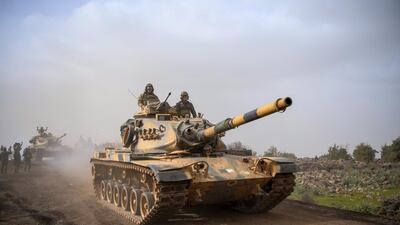Turkey has long accused the United States of supporting terrorism by providing arms to a Kurdish militia in northern Syria. But the group says many of its weapons - including anti-tank missiles - have come from other sources, Turkey among them.
That militia, the People's Protection Units (YPG), has proven a formidable enemy for the Turkish military, which launched an operation against it near the Syrian city of Afrin three weeks ago.
One of the most effective weapons in the YPG’s arsenal has been anti-tank missiles, which they have employed in hit-and-run attacks.
"Most of the weapons that we have, came originally as support from the Turkish army to these groups of mercenaries," YPG spokesman Nouri Mahmoud told The National, referring to Syrian Arab rebel groups that receive support from Turkey.
"We got the majority of the missiles we have from the black market in Idlib, Azaz, Al Bab and Jarablus," Mr Mahmoud said, naming areas of Syria under the control of those groups.
"We got these weapons even though Afrin is besieged by Turkey from three directions."
YPG weaponry has been a source of friction between Turkey and the US since the Americans began arming the group more than two years ago. While Turkey views the YPG as terrorists on account of its links to the Kurdistan Workers' Party, a Kurdish militia that has been at war with the Turkish government since the 1980s, the group also makes up the backbone of the Syrian Democratic Forces, the US’s chief proxy force in the battle against ISIL in Syria.
The Syrian Observatory for Human Rights, which monitors Syria’s multifaceted civil war, has recorded the deaths of at least 22 Turkish soldiers since the operation began, including five in a single YPG attack, likely using such a missile, against a tank on February 3.
One of the Turkish-backed Arab militias participating in the offensive in Afrin also claimed to have intercepted a shipment of anti-tank missiles bound for the YPG from Idlib, a rebel-controlled province to the west of Afrin.
"In general the YPG in Afrin have been able to acquire Konkurs (Russian-made anti-tank missiles)," said Roa Komar, an independent Middle East analyst based in the US. "It’s not entirely clear where they’re getting them from. They’re pretty common in Syria in general. There have been some videos where they don’t show which systems are being used."
_______________
Read more:
Comment: Turkey's objectives are not quite what they seem in Afrin
In Syria's Afrin, locals enlist in YPG and mobilise to defend hometown against Turkey
_______________
Mr Komar also pointed out that a video available online shows the YPG using wire-guided anti-tank missiles, while the US has provided unguided rockets that are less effective against modern tanks.
The US has also supplied the SDF with mortar systems, rocket propelled grenades and heavy machine guns, and Mr Komar said it was likely some US-supplied weaponry had made its way to Afrin.
"Small arms, such as the assault rifles supplied to the SDF, generally tend to proliferate when they are supplied to a non-state actor in Syria," Mr Komar said.
The Syrian government is another possible source of weapons. It has provided weapons to the YPG in the past, and has threatened to respond militarily to Turkey's incursion, which it views as an infringement upon its sovereignty.
"It might be the regime is arming the Kurds not because it likes them, but because it hates the Turks," said Fayez Al Asmar, a spokesman for Turkish-backed Syrian Arab militias who are participating in the offensive as well. "By doing so, the regime wants to weaken the Turkish position and making them have big losses."
Mr Al Asmar also said he believed that weapons sent to Iraqi Kurdish militias by the US and other countries to fight ISIL there were also being sent to Afrin.
"All the Kurds adhere to the same national racial tendency that centers about finding an entity for themselves," Mr Al Asmar said, referring to Syrian and Iraqi projects for autonomy in both countries.
Turkish officials have characterised the arming of the SDF as a betrayal by the US of a NATO ally, but American officials say Turkey has been made aware of what was being provided to the SDF since the US project to arm them began.
"Any and all equipment provided to SDF would be made known to Turkey," said Col Ryan Dillon, a spokesman for the US-led coalition fighting ISIL in Syria and Iraq. "We also maintain accountability of that with our advisers on the ground."
Those advisers, however, are not present in Afrin, which is an enclave surrounded by hostile territory cut off from the larger area under SDF control in eastern Syria, where US troops are embedded with the SDF.
"All the commanders have to pass our vetting purposes – which is no ties with any kind of terrorist organizations and no human rights violations or abuses," Col Dillon said. "They have also said they will use this equipment to only fight ISIL."

